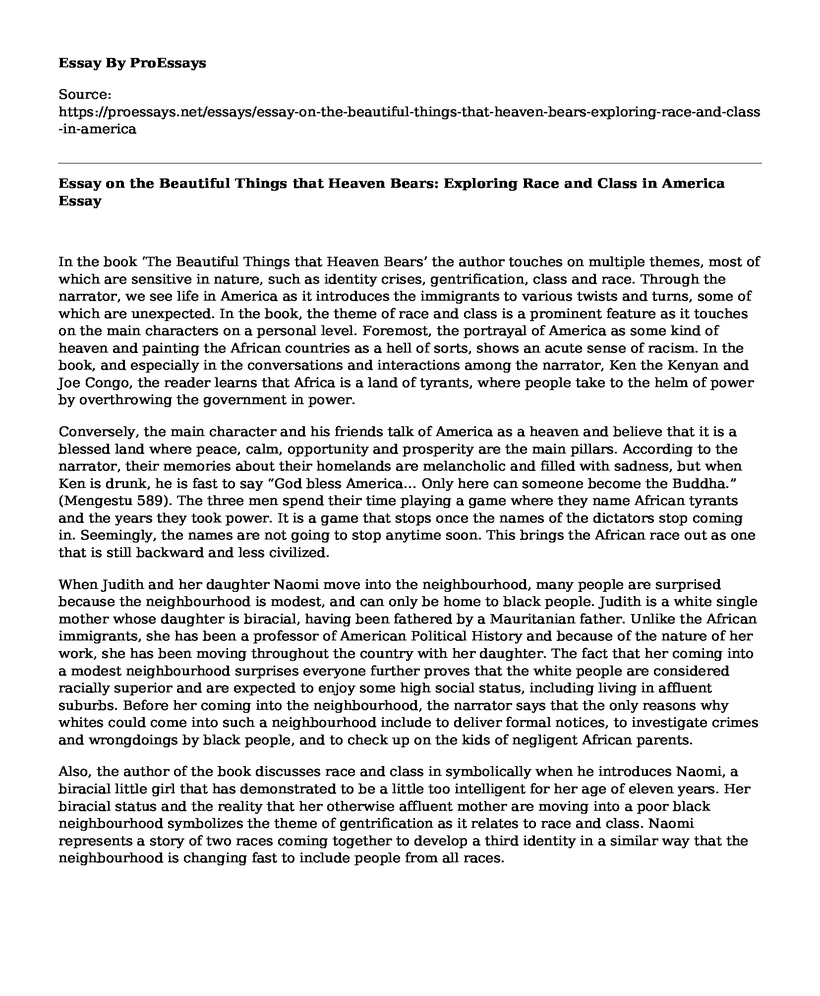In the book ‘The Beautiful Things that Heaven Bears’ the author touches on multiple themes, most of which are sensitive in nature, such as identity crises, gentrification, class and race. Through the narrator, we see life in America as it introduces the immigrants to various twists and turns, some of which are unexpected. In the book, the theme of race and class is a prominent feature as it touches on the main characters on a personal level. Foremost, the portrayal of America as some kind of heaven and painting the African countries as a hell of sorts, shows an acute sense of racism. In the book, and especially in the conversations and interactions among the narrator, Ken the Kenyan and Joe Congo, the reader learns that Africa is a land of tyrants, where people take to the helm of power by overthrowing the government in power.
Conversely, the main character and his friends talk of America as a heaven and believe that it is a blessed land where peace, calm, opportunity and prosperity are the main pillars. According to the narrator, their memories about their homelands are melancholic and filled with sadness, but when Ken is drunk, he is fast to say “God bless America… Only here can someone become the Buddha.” (Mengestu 589). The three men spend their time playing a game where they name African tyrants and the years they took power. It is a game that stops once the names of the dictators stop coming in. Seemingly, the names are not going to stop anytime soon. This brings the African race out as one that is still backward and less civilized.
When Judith and her daughter Naomi move into the neighbourhood, many people are surprised because the neighbourhood is modest, and can only be home to black people. Judith is a white single mother whose daughter is biracial, having been fathered by a Mauritanian father. Unlike the African immigrants, she has been a professor of American Political History and because of the nature of her work, she has been moving throughout the country with her daughter. The fact that her coming into a modest neighbourhood surprises everyone further proves that the white people are considered racially superior and are expected to enjoy some high social status, including living in affluent suburbs. Before her coming into the neighbourhood, the narrator says that the only reasons why whites could come into such a neighbourhood include to deliver formal notices, to investigate crimes and wrongdoings by black people, and to check up on the kids of negligent African parents.
Also, the author of the book discusses race and class in symbolically when he introduces Naomi, a biracial little girl that has demonstrated to be a little too intelligent for her age of eleven years. Her biracial status and the reality that her otherwise affluent mother are moving into a poor black neighbourhood symbolizes the theme of gentrification as it relates to race and class. Naomi represents a story of two races coming together to develop a third identity in a similar way that the neighbourhood is changing fast to include people from all races.
Conclusion
In conclusion, the themes of race and class are prominently brought out in the book through the stories of the main characters – the narrator, Ken the Kenyan, Joe Congo, Judith and Naomi. The themes of race and class are interweaved into such other themes as gentrification, identity crisis, or dual identity, departure and arrival and so on. Broadly, the theme of race and class is structured in such a way that it portrays an inferior black race and a supposedly superior white race.
Works Cited
Mengestu, Dinaw. The beautiful things that heaven bears. Penguin, 2007.
Cite this page
Essay on the Beautiful Things that Heaven Bears: Exploring Race and Class in America. (2023, Aug 08). Retrieved from https://proessays.net/essays/essay-on-the-beautiful-things-that-heaven-bears-exploring-race-and-class-in-america
If you are the original author of this essay and no longer wish to have it published on the ProEssays website, please click below to request its removal:
- The Girl on Train by Paula Hawkins Essay
- Essay Example on Texas: A State of Pride and Ownership
- Essay Example on 11-Year-Old Traveling: Sees Transforming Ideas and Concepts
- Paper Example on Global Trade: China's Dominance in 21st Century Economy
- South Africa Monetary Policy: Growth, Inflation, Unemployment & More - Essay Sample
- Uncovering India, China and West Africa - Essay Sample
- Essay Sample on Brexit's Impact on the British Fashion Industry







